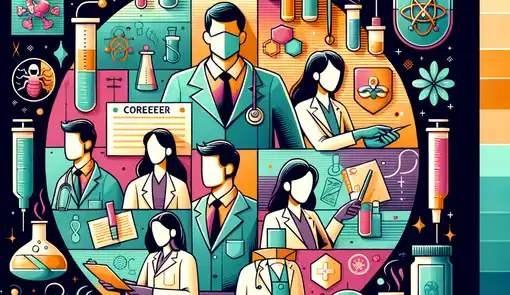Medical Toxicologist
A Medical Toxicologist is a medical professional specialized in the diagnosis, management, and prevention of poisoning and other adverse health effects due to medications, occupational and environmental toxins, and biological agents.

Top Articles for Medical Toxicologist
Sample Job Descriptions for Medical Toxicologist
Below are the some sample job descriptions for the different experience levels, where you can find the summary of the role, required skills, qualifications, and responsibilities.
Junior (0-2 years of experience)
Summary of the Role
A Medical Toxicologist is a doctor who specializes in the prevention, diagnosis, and treatment of poisonings, overdoses, and other adverse effects of drugs, chemicals, and biological substances. As a junior Medical Toxicologist, the role involves working under the supervision of senior toxicologists to assess and manage patients, support public health initiatives, and contribute to research in the field.
Required Skills
- Strong clinical judgement and decision-making skills.
- Ability to work collaboratively in a multidisciplinary healthcare environment.
- Excellent communication and interpersonal skills.
- Proficient in the use of medical software and electronic health records.
- Attention to detail and the ability to manage multiple tasks simultaneously.
- Commitment to ongoing professional development.
Qualifications
- Medical degree from an accredited institution.
- Completion of a residency program in medical toxicology or related field.
- Board eligibility or certification in Emergency Medicine, Pediatrics, or a related specialty preferred.
- Valid and active medical license.
- Basic Life Support (BLS) and Advanced Cardiac Life Support (ACLS) certifications.
Responsibilities
- Conduct thorough patient evaluations to diagnose toxicological issues.
- Assist with the management of poisoning cases, including antidote administration and supportive care.
- Participate in consultations with other healthcare professionals to provide specialized guidance on toxicology-related concerns.
- Support the development and implementation of treatment protocols for toxic exposures.
- Contribute to toxicological research and public health initiatives under senior supervision.
- Stay updated with the latest developments in toxicology and pharmacology.
- Participate in educational programs to increase awareness about toxicity prevention and management.
Intermediate (2-5 years of experience)
Summary of the Role
A Medical Toxicologist is a physician who specializes in the diagnosis, management, and prevention of poisoning and other adverse health effects due to medications, occupational and environmental toxins, and biological agents. This role requires a deep understanding of the clinical effects of toxins, as well as the mechanisms of toxicity.
Required Skills
- Strong diagnostic and problem-solving skills.
- Expertise in pharmacology and toxicology.
- Ability to work collaboratively in a multidisciplinary team.
- Excellent communication and teaching skills.
- Critical thinking and decision-making abilities.
- Proficiency in using medical database software and patient management systems.
Qualifications
- Doctor of Medicine (MD) or Doctor of Osteopathic Medicine (DO) degree.
- Completion of a fellowship in Medical Toxicology.
- Board certification in Medical Toxicology.
- Current, unrestricted medical license.
- Clinical experience in a healthcare setting.
- Experience with patient care in emergency medicine, pediatrics, or a related field.
Responsibilities
- Diagnose and treat patients exposed to toxic substances.
- Provide expertise on poison control and substance overdose management.
- Consult with other healthcare professionals on toxicology concerns.
- Conduct risk assessments and develop management plans for patients with toxic exposure.
- Participate in research on toxic substances and their effects on human health.
- Educate healthcare professionals and the public about toxicological issues.
- Develop and implement treatment protocols for poisoning and overdose cases.
- Serve as an expert witness in court cases involving toxic exposures.
Senior (5+ years of experience)
Summary of the Role
A Medical Toxicologist is a medical professional specialized in the diagnosis, management, and prevention of poisoning and other adverse health effects due to medications, occupational and environmental toxins, and biological agents. As a senior figure, the individual is expected to have extensive experience in clinical care, research, and education in the field of toxicology.
Required Skills
- Advanced knowledge of toxic substances and their effects on human health.
- Strong clinical judgement and decision-making abilities.
- Excellent communication skills for interacting with patients, families, and healthcare professionals.
- Ability to lead and conduct toxicology research.
- Skilled in educational techniques for training medical personnel.
- Competence in managing complex poisoning cases.
- Expertise in public health and preventive medicine related to toxicology.
Qualifications
- Doctor of Medicine (MD) or Doctor of Osteopathy (DO) degree from an accredited institution.
- Board certification in Medical Toxicology from the American Board of Emergency Medicine, American Board of Pediatrics, or other recognized board.
- Minimum of 5 years of clinical experience in medical toxicology post-fellowship.
- Valid state medical license to practice medicine.
- Evidence of scholarly activity, including peer-reviewed publications and presentations at scientific meetings.
Responsibilities
- Diagnose and treat patients exposed to toxic substances, including drugs, environmental agents, and biological toxins.
- Provide consultation services to healthcare providers and public health officials on issues related to toxic exposures.
- Participate in the development and implementation of poison prevention strategies and public health initiatives.
- Lead or contribute to toxicology research projects and publish findings in scientific journals.
- Supervise and train medical staff, residents, and fellows in toxicology principles and practices.
- Develop and review treatment protocols and guidelines for the management of toxic exposures.
- Serve as an expert witness in legal cases involving toxic exposures and poisoning.
- Collaborate with interdisciplinary teams, including emergency medicine, pediatrics, and occupational health professionals.
See other roles in Healthcare, Wellness, and Social Services and Healthcare





